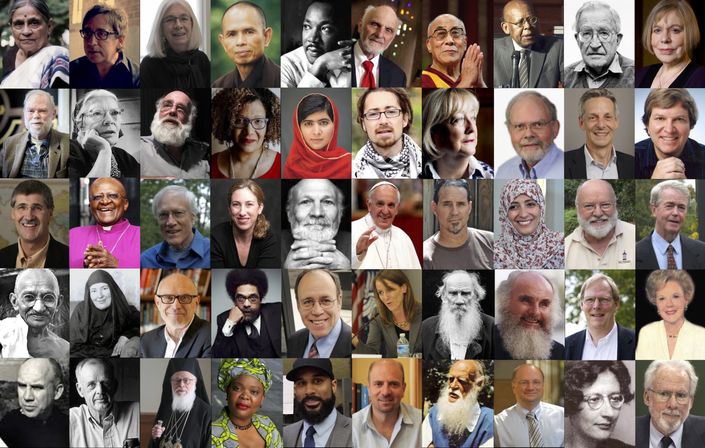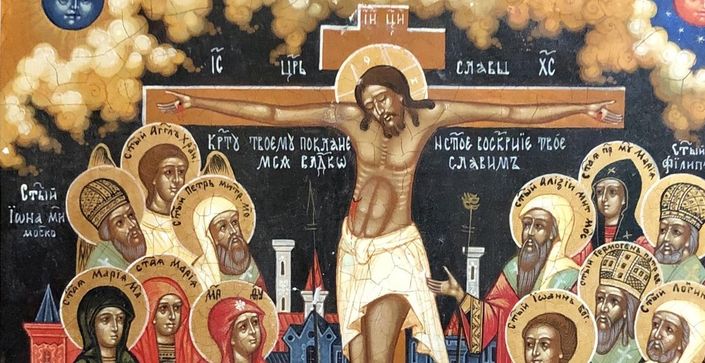Do you want to learn about contemplative peacemaking and how to become attentive to our inner transformation that can then be applied in a number of circumstances related to peacebuilding, nonviolent civil resistance, and peace and justice activism? Then this course is for you.
The inner transformation of a peacemaker gives the interior foundation for being a genuine rather than contrived and inauthentic agent of peace. This course will explore issues of ego, pride, anger, a sense of failure, and other impulses that can be transformed into patience, self-control, compassion, and other virtues—especially humility to overcome 'epistemological hubris'—in circumstances ranging from violent forms of communication to the chaos and trauma of violent conflict. We will therefore explore historical ascetic, spiritual, and contemplative disciplines and exercises that induce our transformation as peacemakers and are directly transferable into real-life situations.
To accomplish this, the following are examples of questions that this course will ask and seek to answer: What do I do if (or how do I prepare myself for when) someone tries to harm me or people I love? How do I acquire the clarity of mind and inner fortitude to deal justly and peacefully with the Other? Into what do I put my efforts and energy in order to be an effective peacemaker? What spiritual and ascetic resources are available to peacemakers to assist in our transformation? How do I incorporate these spiritual and ascetic disciplines into my life? How do I use these spiritual and ascetic disciplines in real life circumstances?
Course Curriculum
- Lecture 1 – Introductory Comments, Guiding Thesis, and Framework for Understanding the Inner Transformation of a Peacemaker (34:51)
- Video Clip — “God Sits and Looks at Me” with Met. Kallistos Ware (The Work of the People)
- Video Clip — "Together" with Phileena Heuertz (The Work of the People)
- Supplemental Reading — Andrew Klager: "An Apologia of Monasticism in an Age of Human Doings and the Idolatry of Achievements" (Clarion Journal)
- Supplemental Reading — Richard Rohr and Thomas Keating – "Healing Our Violence through the Journey of Centering Prayer" | "Healing Our Violence: Weekly Summary"
- Supplemental Reading — Richard Rohr and Thomas Keating – "Healing Our Violence through the Journey of Centering Prayer" | "Catching Violence at the Beginning"
- Glossary of Terms – The Inner Transformation of a Peacemaker
- Contemplative and Ascetic Resources
- Lecture 2 – Helpful Applications and the Theological and Scriptural Basis for the Inner Transformation of a Peacemaker (43:29)
- Video Clip — "What is Contemplative Prayer and Why is it so Needed?" with Richard Rohr
- Video Clip — "Father Martin Laird on Contemplation" (PBS)
- Supplemental Reading – Mario Aguilar, “Introduction: Issues in Contemplation and Politics Today"
- Supplemental Reading — Richard Rohr and Thomas Keating – "Healing Our Violence through the Journey of Centering Prayer" | "Letting Go of the Pain-Body"
- Lecture 3 – Apophasis and Loving Our Enemies: The Practical and Theological Implications of Unknowing (59:12)
- Video Clip — "Recovery and Spirituality: Silence" (The Work of the People)
- Video Clip — “The Fire in Us: How to Become a Christian and What Does It Mean to Follow Christ?” with Fr Seraphim Aldea
- Supplemental Reading – Phileena Heuertz, "Contemplation and Social Justice"
- Supplemental Reading — Richard Rohr and Thomas Keating – "Healing Our Violence through the Journey of Centering Prayer" | "Dom Helder Camara"
- Supplemental Reading — Richard Rohr and Thomas Keating – "Healing Our Violence through the Journey of Centering Prayer" | "The World, the Flesh, and the Devil: The Spiral of Violence"
- Lecture 4 – The Practical Application of the Inner Transformation of a Peacemaker (51:16)
- Video Clip — “Union” with Phileena Heuertz (The Work of the People)
- Video Clip — "Seeking Aliveness: Spirit" with Brian McLaren (The Work of the People)
- Supplemental Reading — Jim Forest and Thomas Merton, "Letter to a Young Activist," "A Square in a Patchwork Quilt," "The Root of Sin is Fear," and "Contemplation in a World of Action"
- Supplemental Reading — Richard Rohr and Thomas Keating – "Healing Our Violence through the Journey of Centering Prayer" | "The Warrior Archetype"
- Lecture 5: Betty Pries — Healing the Divide between Self and Other: Conflict Transformation and Contemplative Spirituality in Dialogue (31:08)
- Video Clip — "Hearing the Voice of Love" with Phileena Heuertz (The Work of the People)
- Video Clip — Thomas Merton – “Conjectures of A Guilty Bystander” (The Work of the People)
- Supplemental Reading — John Paul Lederach, "Spirituality and Religious Peacebuilding"
- Supplemental Reading — Richard Rohr and Thomas Keating – "Healing Our Violence through the Journey of Centering Prayer" | "A Nonviolent Reformation"
- Lecture 6: Walter Thiessen — Radical Self-Acceptance and Individual/Communal Humility as the Basis for Nonviolent Love of Enemies (22:34)
- Video Clip — “Dualism and Identity" with Richard Rohr (The Work of the People)
- Video Clip — “A Contemplative Moment” with Barbara A. Holmes (The Work of the People)
- Video Clip — “Transforming through Love” (The Work of the People)
- Supplemental Reading — Ron Kraybill, "Transforming the Peacebuilder" and "Conflict as Spiritual Path"

Instructor: Dr. Andrew P. Klager is Professor of Religion and Peace Studies at St. Stephen University and is the Director of the Institute for Religion, Peace and Justice at SSU. He earned a PhD in Religious Studies from the University of Glasgow with a focus on Anabaptist history and theology, including the 16th-c. Anabaptist peace tradition(s) and has completed continuing studies in Interfaith Conflict Resolution and Conflict Analysis from the United States Institute of Peace.
Over fourteen years, Andrew has taught 23 different courses (8 of them online) at seven different universities and colleges in BC and Alberta and was a Visiting Research Fellow at the Centre for Studies in Religion and Society at the University of Victoria.
In addition to many presentations, published peer-review articles, and book chapters, Andrew writes regularly for the Huffington Post and Clarion Journal of Spirituality and Justice. He is also the editor of the book, From Suffering to Solidarity: The Historical Seeds of Mennonite Interreligious, Interethnic, and International Peacebuilding (Pickwick, 2015), about which Noam Chomsky wrote, "Andrew Klager's fine collection on the Mennonite way of proceeding 'from suffering to solidarity' provides a most enlightening and instructive guide to these impressive contributions, and what we can learn from them."
Frequently Asked Questions
What should you expect to get out of this course?
Upon successful completion of this course, students will be able to:
- understand and convey what the inner transformation of a peacemaker is, why it’s important, and what it can do to support a life of nonviolence and peacemaking more generally and in the midst of conflict and violence;
- understand and convey the theological, biblical, and theoretical foundation and support of the inner transformation of a peacemaker;
- identify contemplative, ascetic, and spiritual practices, exercises, and disciplines from various Christian traditions that are available to peacemakers to assist in their transformation;
- determine how to incorporate these contemplative, ascetic, and spiritual practices, exercises, and disciplines into the rhythm of their lives, particularly in the many circumstances in which conflict and violence are a threat;
- apply these contemplative, ascetic, and spiritual practices, exercises, and disciplines in practical ways to a number of specific peacebuilding operations and situations.
What is the format and length of the course?
This course has six modules with a total of 3+ hours of lecture material, plus other additional video and written content. Each section contains an exclusive and substantial detailed video lecture that's synchronized with a Keynote presentation ranging from over a half an hour to one full hour long and supplemental video clips from IRPJ's partner and friend, The Work of the People, that are hand-picked by the instructor. This course also includes an exclusive lecture from Betty Pries and Walter Thiessen, as well as supplemental readings provided as PDFs. The course is a completely self-paced, online course.
What materials will I need and will I have access to the lecturers?
All you will need is a computer with internet access and access to the recommended textbooks books (optional). Students can access all exclusive recorded video lectures once enroled. Unfortunately, the instructor is not available to interact or answer questions. Our suggestion would be to dialogue with a group of people going through the course, and to seek out a local practitioner.
How long do I have access to the course?
A lifetime. After enrolling, you have unlimited access to this course for as long as you like — across any and all devices you own.
What if I am unhappy with the course?
We would never want you to be unhappy! If you are unsatisfied with your purchase, contact us in the first 30 days and we will give you a full refund.




